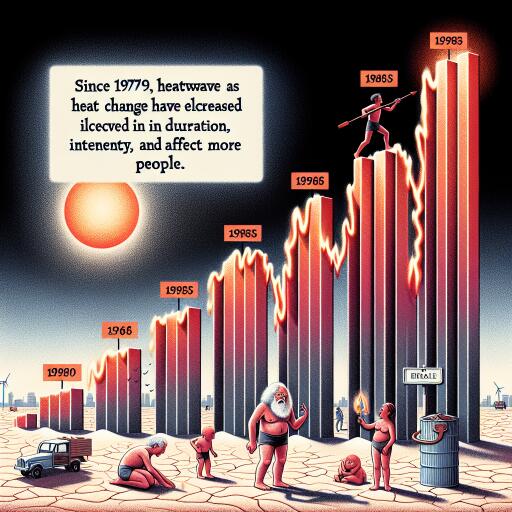
Study Reveals Climate-Driven Heat Waves Intensifying Globally
In recent research, it has been revealed that climate change is exacerbating the severity of heat waves around the world, causing them to move more slowly, span wider areas, and inflict prolonged high temperatures on populations. This change not only threatens human health but also challenges our preparedness and response systems to extreme heat conditions.
The findings, published in the prestigious journal Science Advances, illustrate a concerning trend since 1979, where the pace of global heat waves has decelerated by 20%, resulting in extended duration of extreme temperatures. The occurrence of these heat events has surged by 67%, underscoring a significant climb in both frequency and severity. This rise in temperatures covers larger expanses, effectively trapping more individuals under the sweltering conditions of a heat dome for extended periods.
Prior analyses have touched upon the worsening nature of heat waves, but this recent study delves deeper, offering a comprehensive glance into how these phenomena persist over time and the breadth of their reach across continents. Wei Zhang of Utah State University and Gabriel Lau of Princeton University, the lead researchers behind this study, emphasized the multidimensional impacts of heat waves, highlighting not only their increasing temperatures and expanded coverage but also the prolonged duration and altered movement patterns across regions.
The duration of heat waves has notably increased from an average of eight days during 1979-1983 to twelve days in the period of 2016-2020. Places like Eurasia have experienced particularly elongated periods of heat, while continents such as Africa saw the most significant slowdown in movement. The study also indicates that North America and Australia face the most substantial rise in heat wave magnitude, considering both temperature and area affected.
Lawrence Berkeley National Lab’s Michael Wehner, a climate scientist not involved in the study, commented on the findings, suggesting the study underscores climate change’s role in enhancing the perilous nature of heat waves on multiple fronts.
The extended duration of heat waves mirrors the effect of leaving food in an oven too long — with prolonged exposure, the risk and degree of harm to human communities escalate. “The slower movement implies that the heat wave can persist longer in one area, exacerbating the adverse effects on human health and overall societal wellbeing,” Zhang explained.
Through detailed computer modeling, the research team demonstrated these alterations are a direct consequence of the accumulation of greenhouse gases from fossil fuel consumption. A simulated world without these emissions failed to reproduce the observed amplification of heat wave characteristics over the past 45 years, pointing to a clear linkage with climate change.
The interaction between atmospheric weather patterns, such as the jet stream, and heat waves was also examined. With these atmospheric currents weakening, their typical role in swiftly moving weather systems — including heat waves — has been compromised, contributing to the stagnation or slowed progression of heat across regions.
The comprehensive approach taken by Zhang and his team to study heat waves in relation to shifting weather systems and their movement patterns was lauded by experts outside the study. University of Arizona’s Kathy Jacobs highlighted the novelty of observing heat waves in a broader context, emphasizing the significance of understanding their regional and transcontinental dynamics.
“Global warming’s immediate byproduct is the escalation of heat waves,” remarked Jennifer Francis from the Woodwell Climate Research Center, who was not involved in the study. “The findings add significant weight to this fact, underscoring the urgent need to address the root causes of climate change to mitigate its dire impacts.”





Leave a Reply